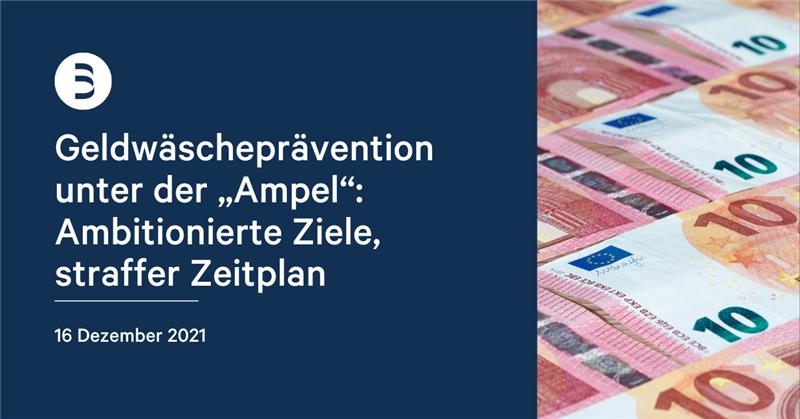
The fight against money laundering was a major issue during the election campaign. In addition to the conflicts between the parties – for example, the introduction of a limit on cash payments – the aftermath of the Wirecard scandal also played a role. Fortunately, the discussion about improving Germany’s anti-money laundering measures has not disappeared with the passing of election day. In their coalition agreement, the SPD (Social Democrats), the Greens and the FDP (Liberals) dedicate a separate subchapter to the topic. But what specific changes will companies affected by the Money Laundering Act (Geldwäschegesetz) now have to prepare for? Which stakeholders will shape the changes to the legal framework in the future? Who has moved into decision-making responsibility? And what developments at EU and OECD level will shape the new federal government’s field of action?
The coalition agreement is ambitious when it comes to money laundering prevention. This begins with improving structures: Consequently, the relevant subchapter also starts with the announcement that the division of responsibilities between the federal government, the federal states and the EU will be “reviewed.” At the same time, the “strategic approach” against money laundering in the Federal Ministry of Finance is to be strengthened “in terms of organization and personnel”. The same applies to the Financial Intelligence Unit (FIU).
A central starting point here is to build up the “necessary information and intelligence base”. This task is seen as a prerequisite for the “ongoing evaluation and improvement of the effectiveness of the fight against money laundering in Germany”. On this basis, the actual submission of money laundering suspicious activity reports from the non-financial sector is to be analysed and increased through more enforcement. In parallel, the limit on cash payments already planned at EU level will be introduced at least on a sector-specific basis: The purchase of real estate with cash is to be prohibited.
These plans will not be implemented in the distant future, but extremely promptly. First, the on-site audit of Germany by the OECD’s Financial Action Task Force (FATF) took place in November 2021. “Possible recommendations” from the audit are expected – in the form of a report – in July 2022. According to the agreement of the coalition parties, they are to be implemented “swiftly into German law.”
On the other hand, the largest ever fundamental revision of the anti-money laundering regulations is currently underway at EU level. In this context, the new German government supports the planned transfer of the “central money laundering provisions” into a regulation that is directly applicable throughout the EU. At the same time, the federal government is in favour of the European Commission’s plan to establish an independent EU money laundering authority – with Frankfurt am Main being suggested as an ideal location. In this blog post, Elisabeth von Reitzenstein and our Brussels office explain which other changes are planned in the EU legislative package and where the lines of conflict currently lie.
Which decision-makers will now shape the implementation of this multitude of projects? Once again, the Federal Ministry of Finance is at the centre. With the change of the leading political party of the house, the staffing of the political posts has also changed. As a result, Dr. Florian Toncar, the former deputy chairman of the FDP parliamentary group and rapporteur for money laundering prevention, has been promoted to Parliamentary State Secretary. The topic is also gaining relevance in other houses. In the Green-led Federal Ministry for Economic Affairs and Climate Protection – which, along with the Foreign Office, coordinates German European policy – Sven Giegold, a proven expert, has been appointed State Secretary. His background will also become visible in overarching issues of economic and European policy which now fall into Giegold’s field of responsibility.
In Federal Parliament (Bundestag), the final distribution of topics among parliamentarians will be agreed with the appointment of the rapporteurs, to be expected for January 2022. One aspect is already becoming clear: Decision makers from the previous legislative term have gained more opportunities to shape money laundering prevention policies. Lisa Paus, who was the Green rapporteur for the issue, is now the deputy chairwoman of the parliamentary group and Head of the Green Working Group on Finances, Budget, Economy, Work and Social Affairs. Christian Dürr, former Head of the Working Group on Budget and Finances of the FDP, has been elected chairman of the Liberals’ parliamentary group. The Social Democrats demonstrate continuity in their personnel: Dr. Jens Zimmermann is again a member of the Finance Committee and the Digital Affiairs Committee for the SPD.
In summary: The new federal government can get started right away – and will do so, given that the decision-makers already have deep knowledge of the topic. The continuous improvement of supervision and strengthening of enforcement are priorities that can be addressed long before the comprehensive EU reform is adopted. The FATF’s report on the results of its audit of Germany, due in summer 2022, also increases the pressure to act. Companies affected by the implementation of anti-money laundering measures must therefore act now to put their concerns on the policy implementation agenda.